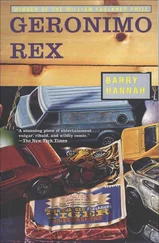Then Dr. Levaster met V.T., the Yugoslav sensation, drinking a beer at Elaine’s with a noted sportswriter. Forest Hills was to begin the next day. Levaster approved of V.T. Heroic bitterness informed V.T.’s face and he dressed in bad taste, a suit with padded shoulders, narrow tie, pointy shoes.
“Who did you draw first round?” asked Levaster.
“Freench Edwaird,” V.T. said.
“Edward won’t get around your serve if you’re hitting it,” said the sportswriter. V.T.’s serve had been clocked at 170 mph at Wimbledon.
“Ees always who find the beeg rhythm. You find the beeg rhythm or you play on luck.”
“If you beat Edward tomorrow,” Levaster said, “I will eat your suit.”
But the two men had turned away and never heard.
He took the Lincoln out to the West Side Tennis Club and tore his sweater clambering over a fence. He slept in a blanket he had brought with him, out of the dew, under the bleachers. When morning came, Levaster found the right court. The grass was sparkling. It was a heavy minor classic in the realm of tennis. The crowd loved French Edward and V.T., the both of them. When Edward hit one from behind the back for a winner off an unseen overhead smash from V.T., the crowd screamed. V.T. was in his rhythm and knocking his serve in at 160 mph. The crowd adored this too. French, who had always had a big, very adequate serve, took up the velocity of it to match the great bullet of V.T. At the end, they were men fielding nothing but white blurs against each other. Edward won.
For a half second the crowd was quiet. They had never imagined the ball could be kept in play at such stupendous speed. Then they roared. French Edward leaped over the net. Levaster swooned. His head sailed and joined the head of French Edward, rolled and tossed in the ale-colored curls. Then Levaster saw Dr. Word run out onto the grass, his bellowing lost in the crowd’s bellowing. The old man, whose beret had fallen off on the churned service court, put his hand on French’s back. Word looked frail, liver spots on his forearms, his scalp speckled and lined. Levaster saw French turn in anger. Then the both of them were overrun by a whirlpool of well-groomed tennis children and mothers and men who rode trains to work, half of their mental life revolving around improvement of the backhand. Levaster wished for his elegant pistol. He left, picking fights with those who looked askance at his blanket.
A few years passed and Levaster was almost forty. He opened the clinic in New Orleans again. Then he closed it and returned to New York. Now Levaster admitted that he languished when French Edward was out of his vision. A hollow inconsequence filled his acts, good or evil, whenever Edward was not near. He flew with Edward to France, to Madrid, to Prague. He lay angry and mordant with hangover on hotel beds as French Edward worked out on the terrible physical schedule Levaster had prescribed — miles of running, sit-ups, swimming, shadow-boxing.
Edward was hardly ever beaten in an early round, but he was fading in the third and fourth day of tournaments now. He had become a spoiler against high seeds in early rounds, though never a winner. His style was greatly admired. A Portuguese writer called him “the New Orleans ace who will not surrender his youth.” The Prague paper advocated him as “the dangerous happy cavalier”; Madrid said, “He fights windmills, but, viewing his style, we are convinced his contests matter.” Yes, thought Levaster, this style must run its full lustrous route. It cannot throw in the towel until there is the last humiliation, something neither one of us can take.
Then it occurred to Levaster. French had never been humiliated in a match. He had lost, but he had never been humiliated. Not in a single match, not a single game. The handsome head had never bowed, the rusting gold of French Edward’s curls stayed high in the sun. He remained the sage and brute that he was when he was nineteen. There was still the occasional winner off his racket that could never have been predicted by the scholars of the game. Levaster felt his soul rise in the applause for this. In Mexico City, there was a standing ovation for the most uncanny movement ever seen on the court. El Niño de Merida smacked down an overhead that bounced high and out of play over the backstop. But Edward had climbed the fence to field it, legs and one arm in the wire, racket hand free for the half second it took to strike the ball back, underhanded. The ball took a boomerang arc to the other side and notched the corner of the ad court. My Christ, thought Levaster, as the Mexicans screamed, he climbed the fence and never lost style.
When they returned from this trip, Levaster read in the paper about an open tournament at Vicksburg. Whitney Humble had already been signed up. The prize money was two thousand dollars, singles winner take all. They called it the Delta Open.
“I know Word has something to do with this. Nobody in Vicksburg ever gave a damn about tennis but him, you Baby, and me,” French Edward said.
“You should let the home folks finally see you. Your image would do wonders for the place,” said Levaster. “They’ve read about you. Now they want to see you. Why not? I’ve been wanting to go back and put a head-marker on my mother’s grave, though it would be false to what she was. I’ve got all this money hanging around. I get sentimental, guilty. Don’t you ever?”
“Yes,” French Edward said.
They went back to Vicksburg. On the second day of the tournament, they got a call at the Holiday Inn. Fat Tim Emile had died. Nobody had known he was dying but him. He had written a short letter full of pride and appreciation to Cecilia and French, thanking French for his association with the family and for valiant contests in the tennis world. Fat Tim left them two hundred thousand and insisted on nobody giving any ceremony. He wanted his remaining body to go straight to the Tulane med school. “This body,” he wrote, “it was fat maybe, but I was proud of it. Those young doctors-to-be, like Baby Levaster, might find something new in me. I was scared all my life and stayed honest. I never hurt another man or woman, that I know of. When I made money, I started eating well. Baby Levaster warned me. I guess I’ve died of success.”
“My poor Cecilia,” said French.
“Cissy is fine,” said Levaster. “She said for you to finish the tournament.”
So he did.
Levaster looked on in a delirium of sober nostalgia. Through the trees, in a slit of the bluffs, he could see the river. French’s mother and father sat together and watched their son. Dr. Word, near eighty, was a linesman. They are old people, thought Levaster, looking at the Edwards. And him, Word, he’s a goddamned relic . A spry relic. Younger brother Wilbur was not there because he was dead.
Whitney Humble and French Edward met in the finals. Humble had aged gruesomely too, Levaster saw, and knew it was from fighting it out in small tournaments for almost two decades, earning bus fare and tiny fame in newspapers from Alabama to Idaho. But Humble still wanted to play. The color of a dead perch, thinner in the calf, Humble smoked cigarettes between ad games. All his equipment was gray and dirty, even his racket. He could not run much anymore. Some teeth were busted out.
A wild crowd of Vicksburg people, greasers and their pregnant brides from the mobile homes included, met to cheer French. Humble did not have a fan. He was hacking up phlegm and coughing out lengths of it, catching it on his shirt, a tort even those for the underdog could not abide. The greasers felt lifted to some estate of taste by Humble.
It was a long and sparkling match. Humble won.
Humble took the check and the sterling platter, hurled the platter outside the fence and into the trees, then slumped off.
Читать дальше












